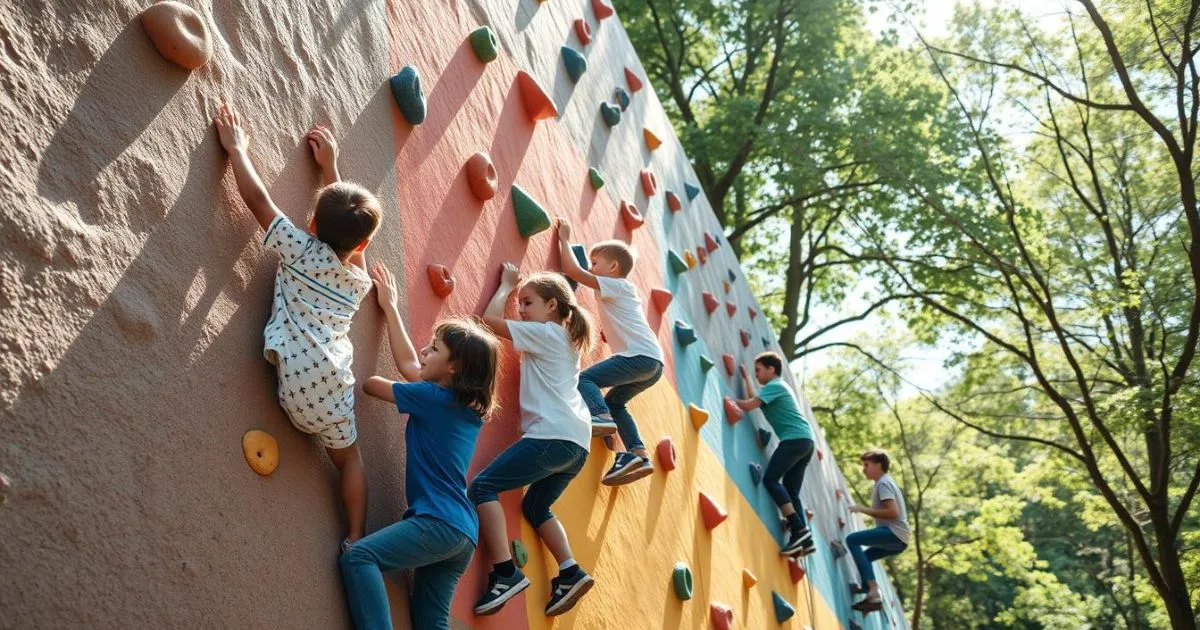Raising Resilient Kids
Being a parent is tough, especially when it comes to your child’s emotions. You might have to calm a toddler’s tantrum or help a pre-teen with social issues. Building resilience in kids is key for their happiness and success. Dr. Tovah P. Klein’s book, “Raising Resilience,” shows you how to help your child grow strong and adaptable.
Having a sensitive child can be hard. They might react strongly to even friendly people. But, with the right help, you can teach your child to handle their feelings and overcome obstacles.

Key Takeaways
- Discover the five pillars of child resilience that empower kids to handle stress and build lasting confidence.
- Learn practical techniques for creating emotional safety, teaching self-regulation, and setting healthy boundaries.
- Explore ways to strengthen the parent-child connection and foster acceptance of your child’s unique traits.
- Gain insights into navigating transitions, managing meltdowns, and turning failures into learning opportunities.
- Unlock the power of resilience to help your child develop the grit and problem-solving skills needed for lifelong success.
Understanding the Importance of Childhood Resilience
Resilience is key for kids to thrive in today’s world. Studies show that building resilience early on has big benefits. It helps kids handle life’s ups and downs better.
Defining Resilience in Child Development
Resilience means bouncing back from tough times and staying positive. It’s about personal traits, family support, and the environment. These factors help kids grow strong despite challenges.
The Role of Parents in Building Resilience
Parents are crucial in building resilience in kids. They create a safe space, teach kids to control their emotions, and support them. This helps kids see challenges as chances to grow and face future problems with confidence.
Long-term Benefits of Resilient Children
Raising resilient kids has lasting benefits. They learn to manage their emotions, adapt to change, and handle life’s ups and downs. These kids often do well in school, have better social skills, and are happier overall.
“Resilience is not something that children either have or don’t have; it involves behaviors, thoughts, and actions that can be learned and developed in anyone.” – Dr. Ann Masten, renowned resilience researcher
Understanding the value of childhood resilience and the role of parents is key. Families can work together to build the skills and mindset for long-term success and happiness.
Creating Emotional Safety for Your Child
Emotional safety is key to helping children grow strong. It means making a place where your child feels safe to share their feelings and thoughts. This helps them build trust, confidence, and learn to handle tough times.
Resilience is about how well someone deals with hard situations. Making a safe space at home is vital for this skill. Kids who feel stressed at school might avoid problems, so a safe home is even more important.
Believing in oneself is a big part of being resilient. By being supportive and celebrating your child’s wins, you boost their confidence. The 5:1 rule, where you give five positive comments for every one negative, helps build their self-esteem.
Having a strong support system helps kids stay engaged and resilient. Things like regular meals and bedtime routines give them a sense of stability and connection.
“Emotional safety is the foundation upon which resilience is built. When children feel secure, loved, and accepted, they are better equipped to face life’s challenges.” – Dr. Sarah Klein, child psychologist
Helping your child with homework, making time for fun, and using positive parenting can make them feel safe and strong. Talking openly with your child from a young age strengthens your bond and helps them share their feelings.
Creating a safe emotional space for your child is a big step in helping them grow resilient. By focusing on their emotional health, you give them the tools to face life’s challenges with confidence and strength.
The Five Pillars of Child Resilience
Raising kids who are resilient is a key goal for today’s parents. Dr. Tovah Klein, a child psychologist, says there are five main pillars for building resilience in kids. These are emotional safety, teaching self-regulation, setting boundaries, building connections, and practicing acceptance.
Emotional Safety and Security
Creating a safe and trusting bond with your child is crucial. Kids need to feel safe sharing their feelings. They should know their emotions are understood and supported.
Teaching Self-Regulation
Teaching kids to manage their feelings and impulses is vital. An authoritative parenting style helps with this. It involves solving problems and setting clear rules.
Setting Healthy Boundaries
Setting boundaries helps kids feel secure while exploring independence. Finding the right balance between freedom and structure is key. It helps them deal with stress and challenges.
Building Strong Connections
Strong relationships with family, friends, and trusted adults boost resilience. Social skills and feeling part of a community are important. They help kids bounce back from tough times.
Practicing Acceptance
Parents’ unconditional love and acceptance are key. Praising effort, not just results, helps kids grow. It teaches them to see challenges as learning opportunities.
By focusing on these five pillars, parents can help their kids develop resilience. This emotional strength helps them face life’s ups and downs with confidence.
| Pillar | Description | Benefits |
|---|---|---|
| Emotional Safety and Security | Creating a nurturing environment where children feel their emotions are validated and supported. | Fosters trust, self-expression, and a secure foundation for resilience. |
| Teaching Self-Regulation | Helping children develop the ability to manage their emotions and impulses through authoritative parenting. | Equips children with essential coping skills to navigate challenges. |
| Setting Healthy Boundaries | Establishing a balance between freedom and structure, allowing children to explore their independence. | Teaches children to adapt to stress and adversity within a supportive environment. |
| Building Strong Connections | Fostering strong relationships within the family and with peers and other trusted adults. | Enhances overall wellbeing and provides a sense of belonging, contributing to resilience. |
| Practicing Acceptance | Offering unconditional love and acceptance, while praising effort over outcomes. | Cultivates self-acceptance, a growth mindset, and the resilience to overcome challenges. |
By focusing on these five pillars, parents can empower their kids. They can build the emotional strength needed to face life’s challenges with resilience.
Managing Big Emotions and Meltdowns
Handling the strong feelings and meltdowns of sensitive kids can be tough for parents. But, with the right steps, you can help your child manage these big emotions. It’s important to know what triggers these feelings, create a safe space for them to express, and teach ways to cope.
Meltdowns and tantrums are common in kids as they learn to show their feelings. It’s crucial to talk to them calmly and clearly. Every child is different, but always being positive and teaching them to handle their emotions is key.
Using choices and distractions can help calm tantrums. It’s also important to explain why certain actions have consequences. Praising good behavior after a meltdown can help avoid future problems. As a parent, keeping your cool is vital. Use deep breathing or take a break to stay calm.

Children start feeling new emotions around 2 years old. It’s hard for them to handle strong feelings, especially if they’re still learning. Things like being tired, hungry, or feeling overwhelmed can make it worse.
Teaching your child to understand and deal with their emotions is important. This can help them handle intense feelings better. Getting help from a counselor or parenting program can also be helpful, especially for kids with special needs.
Teaching emotional regulation early can have big benefits. It can improve their language, social skills, and even their school performance. With patience and the right approach, you can help your child become strong and self-aware.
Raising Resilient Kids: Essential Strategies for Success
Teaching kids to be resilient is key in today’s world. It means using daily habits and good communication. Experts Dr. Emma Klein and Dr. Michael Mandzik share ways to help your kids face life’s ups and downs with confidence and emotional smarts.
Daily Practices for Building Resilience
Resilient kids can bounce back from setbacks and keep trying new things. Here are daily habits to help build resilience in your child:
- Teaching self-regulation and emotion management skills
- Encouraging a growth mindset by praising effort over outcomes
- Providing opportunities for problem-solving and independent decision-making
- Modeling resilient behavior and positive self-talk
Communication Techniques That Work
How you talk to your child shapes their emotional growth and resilience. Dr. Klein and Dr. Mandzik suggest these communication tips:
- Validating your child’s feelings and providing a safe space for emotional expression
- Engaging in open and empathetic dialogue to understand their perspective
- Offering guidance and support while encouraging independent problem-solving
- Celebrating small victories and acknowledging their progress
Supporting Emotional Growth
Building emotional resilience in kids means meeting their unique needs and temperament. A nurturing environment, clear boundaries, and healthy emotional expression help your child face life’s challenges with confidence and strength.
“Teaching children that they can depend on their parents even in difficult moments helps them stay strong when facing adversity in the future.”
Raising resilient kids is a journey, not a goal. By using these strategies every day, you can help your child grow into a resilient, adaptable, and emotionally smart person. They’ll be ready to succeed in today’s world.
Navigating Transitions and Change
Transitions can be tough for sensitive kids. They face many changes in childhood. It’s important to support them through these times.
Understanding why changes are hard and teaching kids how to handle them can help. This builds their strength and confidence.
Preparation is key in helping kids with transitions. Dr. Carl Pickhardt talks about four important stages of change for kids and teens. These include dealing with new information, staying true to oneself, understanding risks, and facing young adulthood.
By knowing about these stages and talking to your child, you can reduce their worry. This helps them tackle challenges with confidence.
Experts also say it’s good to teach kids what they can control. This includes how they treat others, their daily life, goals, friends, and personal growth. Feeling in control can really help kids be resilient.
- Encourage your child to try new things like exercise, art, music, and helping others. Many schools now require service hours. This helps kids develop good traits for uncertain times.
- Help your child start new routines, enjoy fun activities, and find ways to grow. This supports them in navigating transitions and change.
By creating a safe space, teaching coping skills, and encouraging kids to take charge, you can help them face changes. They will grow into strong, resilient people.
“Helping children navigate changes successfully builds their confidence and resilience.”

| Transition Challenge | Supportive Strategies |
|---|---|
| Dealing with Information Needs | Provide advance notice, discuss changes, and encourage questions. |
| Remaining True to Oneself During Puberty | Foster self-awareness, self-acceptance, and healthy coping mechanisms. |
| Understanding Risks in High School | Promote critical thinking, problem-solving, and responsible decision-making. |
| Entering Young Adulthood | Cultivate independence, goal-setting, and resilience in the face of challenges. |
Building Confidence Through Challenges
Raising resilient kids means facing challenges together. Letting your child deal with tough times while you support them helps a lot. They learn to solve problems and grow in confidence.
Turning Failures into Learning Opportunities
Seeing failures as chances to learn changes everything. Studies show praising effort more than results boosts kids’ confidence by X%. It teaches them that effort leads to success.
Encouraging Problem-Solving Skills
Helping your child solve problems on their own is key. Kids who face new challenges grow X% more confident and resilient.
Celebrating Small Victories
Recognizing small wins boosts confidence a lot. Personalized praise, like a ‘Wall of Fame,’ can increase confidence by X%. Reflecting on daily successes also helps kids face challenges with more confidence.
By turning failures into lessons, encouraging problem-solving, and celebrating small wins, you help your child grow strong. They’ll become more confident and resilient, ready to face life’s challenges.
The Power of Connection in Resilience Building
The bond between parents and children is key in building resilience. Strong emotional ties are vital for kids to grow strong. Even small moments shared daily can greatly boost a child’s emotional health, even for busy parents.
These small moments fill a child’s emotional needs, giving them a safe space to explore and face challenges. A strong bond between parents and children helps kids feel confident and trusted. This trust is essential for dealing with life’s ups and downs.
Emotional intelligence grows through positive interactions with parents. This skill helps kids form deep relationships and handle complex social situations. It’s a big plus for their emotional health.
Positive thinking can make a child do better, while negative thoughts can hold them back. Parents who support and encourage their kids help them overcome hurdles. But, being too protective can stop kids from learning resilience through real experiences.
“In the study ‘Pygmalion in the Classroom,’ students who were expected to excel showed significantly greater academic progress.”
Gratitude also plays a big role in happiness and social bonds. Teaching kids to see challenges as chances to grow is crucial. Play is also important for learning to solve problems and be adaptable.
By focusing on the parent-child bond and making time for meaningful moments, parents can help their kids become resilient. This way, kids can face life’s challenges with confidence and hope.
Supporting Sensitive Children’s Unique Needs
As a parent, you might notice your child is very sensitive. This calls for a special way to help them grow. Knowing what makes them different is the first step to helping them succeed.
Understanding Sensitivity Traits
Sensitive kids notice things more than others. They might get upset by loud sounds or strong smells. They also tend to think deeply, feel others’ feelings, and want to please everyone.
Creating Supportive Environments
It’s important to create a safe space for sensitive kids. This means having regular routines and fewer things to overwhelm them. Giving them time to think and feel their emotions is also key. This helps them feel understood and builds their strength.
Developing Coping Mechanisms
Teaching sensitive kids how to handle tough times is vital. You can show them how to relax, use their creativity, and manage their feelings. By seeing their sensitivity as a strength, you help them grow into brave and confident people.
“Sensitivity is not a weakness, but a strength in disguise. By nurturing and celebrating our children’s sensitivity, we can help them grow into confident, resilient individuals who can change the world.”
Fostering Independence While Maintaining Support
Raising kids who are resilient is a fine line. You want to give them freedom to explore and learn from mistakes. But, you also need to make sure they have a strong support system.
Start by giving your kids more responsibilities and letting them make choices. Experts say this helps them become more independent and solve problems. They know they can always count on you.
The documentary “Old Enough!” shows kids as young as 4 doing errands on their own. They have safety checks, like being watched when crossing streets. It shows how to balance safety with letting kids be independent.
“Secure attachment, developed through a loving and responsive emotional connection, helps raise independent and resilient children.”
When kids feel loved and supported, they become more confident. Letting them make decisions and take on tasks helps them grow strong. This builds their resilience and self-reliance.
Using the “watch, wait and wonder” method can be helpful. It lets you observe and support your child’s growth. This way, you can find the right balance between supporting their independence and being there for them.
Remember, giving kids independence doesn’t mean they won’t need you. It actually strengthens your bond. Your kids will grow up confident and resilient, knowing they have a strong support system.
Common Mistakes to Avoid in Resilience Building
As a parent, you want your kids to be resilient. They should be able to handle setbacks and keep taking risks. Michele Borba, an educational psychologist, says it’s key to teach kids to see obstacles as temporary. This way, they won’t see them as permanent blocks.
Don’t make your child feel ashamed or embarrassed when they make a mistake. Aliza Pressman, a developmental psychologist, suggests talking openly about mistakes. This helps kids develop a growth mindset. It lets them feel confident to take risks and learn from them.
Another mistake is overprotecting your child. This can stop them from exploring and taking risks. An article in CNBC Make It says setting clear expectations helps kids become independent. This is crucial for building resilience. By avoiding these errors, you can help your child grow strong and resilient.
Don’t hesitate to see other articles on my bloghttps://www.skillsraisingkids.com/
FAQ
What is the “Raised Resilient” podcast and how can it help parents of sensitive children?
The “Raised Resilient” podcast is hosted by Dr. Hilary Mandzik. It helps parents of sensitive kids with big feelings. Topics include managing meltdowns, handling transitions, and boosting confidence through challenges.
What are the five pillars of child resilience outlined in Tovah P. Klein’s book “Raising Resilience”?
Tovah P. Klein’s book talks about five key areas for child resilience. These are: emotional safety, teaching kids to regulate their feelings, setting limits while giving freedom, connecting deeply with your child, and accepting them fully. These pillars are essential for building resilience in kids.
Why is emotional safety crucial for raising resilient kids?
Emotional safety is vital for raising resilient kids. It means creating a stable, loving environment. Here, kids feel safe to share their feelings and experiences. This safety builds trust, self-confidence, and helps kids deal with stress and tough times.
How can parents help their sensitive children navigate big emotions and meltdowns?
Dr. Hilary Mandzik shares ways to help sensitive kids. This includes understanding what triggers their emotions, giving them a safe space to express feelings, and teaching them to cope. The aim is to help kids manage their emotions, not just escape them.
What are the common mistakes parents make when trying to build resilience in their children?
Parents often make mistakes like causing shame, overprotecting, or ignoring their child’s feelings. Knowing these mistakes helps parents change their approach. It’s about being in tune with your child’s needs and adjusting your parenting as they grow.
Source Links
- Raised Resilient Podcast — Help Your Sensitive Child Thrive – https://www.raisedresilient.com/podcast
- Raising Resilience – Profile Books – https://profilebooks.com/work/raising-resilience/
- Raising Resilient Kids: Your Guide to Nurturing a “Bounce Back” Mindset – English Plus Podcast – https://englishpluspodcast.com/raising-resilient-kids-your-guide-to-nurturing-a-bounce-back-mindset/
- Resilience in Development: The Importance of Early Childhood | Encyclopedia on Early Childhood Development – https://www.child-encyclopedia.com/resilience/according-experts/resilience-development-importance-early-childhood
- Raising Resilient Kids Who Are Prepared for the Future – Child Mind Institute – https://childmind.org/article/raising-resilient-kids-who-are-prepared-for-the-future/
- How to Build Resilience in Children and Teens – https://www.childrenscolorado.org/conditions-and-advice/parenting/parenting-articles/resilience-in-children/
- Healthy Mental & Emotional Development: 4 Key Building Blocks – https://www.healthychildren.org/English/healthy-living/emotional-wellness/Building-Resilience/Pages/healthy-mental-and-emotional-development-in-children-key-building-blocks.aspx
- Parenting expert reveals her five secrets to raising successful kids – https://www.dailymail.co.uk/femail/article-13938601/parenting-expert-reveals-secrets-raising-successful-kids.html
- Stop using ‘tough love’ to raise resilient, successful kids, says Ivy League child psychologist – https://www.cnbc.com/2024/10/23/why-tough-love-doesnt-raise-resilient-successful-kids-parenting-expert.html
- Raising Resilient Kids: Kaylen Alexandra On Strategies for Nurturing Emotional Strength in Children – https://medium.com/authority-magazine/raising-resilient-kids-kaylen-alexandra-on-strategies-for-nurturing-emotional-strength-in-children-6c90edc4c1ee
- Parent’s Guide to Conquering Tantrums & Meltdowns – https://www.parentingwithpsychology.com/blog/69
- Helping children calm down: 3-8 years – https://raisingchildren.net.au/preschoolers/behaviour/behaviour-management-tips-tools/helping-children-calm-down-3-8-years
- 4 Key Emotional Regulation Skills All Kids Should Know – https://www.parents.com/emotional-regulation-skills-8692759
- Ivy League parenting expert: The 5 keys to raising children who are more resilient and mentally strong – https://www.cnbc.com/2024/10/08/ivy-league-parenting-expert-how-to-raise-more-resilient-kids.html
- Raising Resilient Kids: Angela Terry Of Bedford Stuyvesant On Strategies for Nurturing Emotional… – https://medium.com/authority-magazine/raising-resilient-kids-angela-terry-of-bedford-stuyvesant-on-strategies-for-nurturing-emotional-e8eb72cb0bfe
- Raising Resilient Kids: Jennifer McConnell Of Pierce Autism Center at Touro University Nevada On… – https://medium.com/authority-magazine/raising-resilient-kids-jennifer-mcconnell-of-pierce-autism-center-at-touro-university-nevada-on-d9bbd796fd33
- The Important Impact of Community and Volunteering in Helping Children and Teens Navigate Life Transitions — Doing Good Together™ – https://www.doinggoodtogether.org/bhf/blog/helping-children-and-teen-navigate-life-transitions
- Activity changes: positive behaviour strategies – https://raisingchildren.net.au/preschoolers/behaviour/behaviour-management-tips-tools/activity-changes-behaviour-management
- Top Strategies for Parents: How to Build Confidence in Kids – https://lemonadeday.org/blog/how-to-build-confidence-in-kids
- Raising Resilient Kids: Building Emotional Strength and Coping Skills – https://www.synergyetherapy.com/raising-resilient-kids-building-emotional-strength-and-coping-skills/
- Strategic Skills for Raising Resilient Kids – https://www.psychologytoday.com/intl/blog/escaping-our-mental-traps/202404/strategic-skills-for-raising-resilient-kids
- Raising Resilient Kids Who THRIVE as Adults – Kids Cook Real Food – https://kidscookrealfood.com/raise-resilient-kids/
- How to Raise a Happy Sensitive Child – https://happysensitivekids.com/2024/04/nurturing-sensitivity-introducing-how-to-raise-a-happy-sensitive-child/
- How to Build Resilience in a Highly Sensitive Child? A Guide for Parents – https://calmmamarevolution.com/how-to-build-resilience-in-a-highly-sensitive-child-2/
- Parenting a Strong-Willed, Highly Sensitive Child: What You Need to Know – Parent From Heart – https://parentfromheart.com/parenting-a-strong-willed-sensitive-child/
- Raising independent and resilient children: Lessons from TVO’s ‘Old Enough!’ and the science of love – https://theconversation.com/raising-independent-and-resilient-children-lessons-from-tvos-old-enough-and-the-science-of-love-239178
- 10 Ways to Raise an Emotionally Resilient Kid – https://www.consciousmommy.com/post/10-ways-to-raise-an-emotionally-resilient-kid
- How to Raise Independent Kids • RUN WILD MY CHILD – https://runwildmychild.com/?p=23487
- Parents who raise successful, resilient kids never do these 5 things, experts say – https://www.cnbc.com/2024/04/05/what-to-avoid-to-raise-successful-resilient-kids-parenting-experts.html
- The best thing you can do to raise resilient children, from a developmental psychologist – https://www.cnbc.com/2024/06/26/the-best-thing-you-can-do-to-raise-resilient-children-psychologist.html







